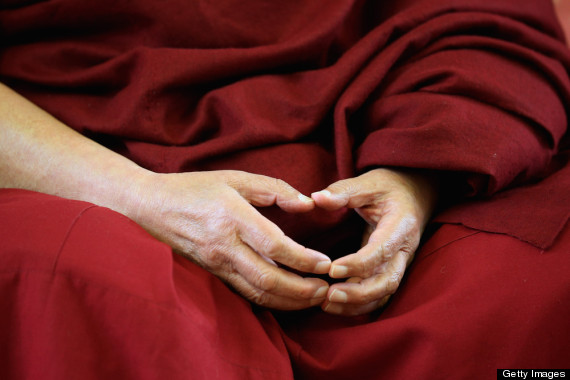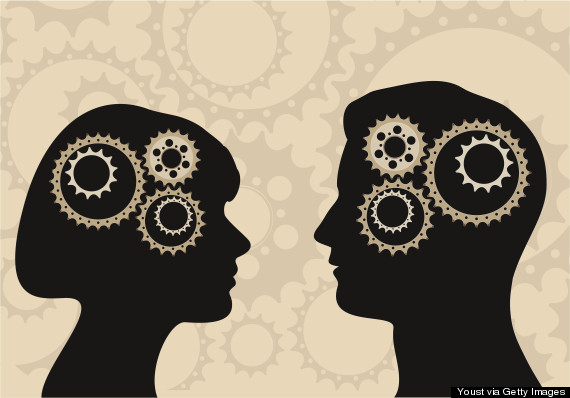
Despite everything we know about human behavior and relationships, love remains a mystery to us. It causes us the greatest joy and the greatest pain, overwhelms us with inexplicable emotions, and makes us act in completely irrational ways. As if that weren't enough, we often feel we have little say in who becomes the object of our affection. In short, love seems to operate with little rhyme or reason. As Einstein put it, "Gravity cannot be held responsible for people falling in love."
But neuroscientists are coming to a better understanding of the ways romantic and other types of love occur in the brain, which could help us boost our capacity for love and improve our relationships. Research from Yale University published this week found some particularly startling neurological differences between two different varieties of love: romantic and selfless.
"Experientially, romantic love leaves you wanting more -- you want that next date, you want the next tweet, you want that next text -- whereas selfless love is boundless," Judson Brewer, director of research at the Center for Mindfulness and an associate professor at UMass Medical School, told the Huffington Post. "All you need to do is drop into it... It doesn't have that same driving quality to it, where you're strung out on it. It's wide open, it's delicious."
In honor of Valentine's Day, here are four things that neuroscience can teach us about the "most powerful emotion."
Selfless love makes us happy.

The Yale research, published in the journal Brain and Behavior, found that selfless love, which stems from deep compassion and desire for someone else's happiness without receiving anything in return, activates the same reward center of the brain as cocaine. And it deactivates the reward areas associated with romantic love -- for instance, the feeling that arises when lovers see each other.
Romantic love, unlike selfless love, activates parts of the brain associated with habit formation and drug addiction, says Brewer. The researchers also found, most interestingly, that selfless love deactivated self-oriented thinking in the brain -- the type of thinking, when something happens, that causes us to ask, "How does this affect me?"
"[Those regions] were not only not activated, but they were significantly deactivated in experienced meditators compared to novices," Brewer told the Huffington Post. "So this selfless type of love seems to be deactivating brain regions associated with self-referential processing... People were actually not doing things in a self-referential way."
Love is addictive.

Another big difference the Yale researchers found was that while selfless love is not characterized by wanting or craving, romantic love can be addictive. A great deal of previous research has found that romantic love does indeed cause wanting and craving, and triggers the same pleasure centers in the brain as cocaine.
"Romantic love is an obsession, it possesses you," anthropologist Helen Fisher, author of Why We Love, said in a TED talk about the brain in love. "You can't stop thinking about another human being. Somebody is camping in your head.... Romantic love is one of the most addictive substances on Earth."
The sting of being rejected by someone you love? That response is rooted in the brain, too, Fisher found.
"When you're dumped, the one thing you want it to just forget this human being and move ahead with your life, but no, you just love them harder," Fisher said. "The reward system for wanting, for motivation, for craving for focus, becomes more active when you can't get what you want."
This explains why we kill ourselves and others, start wars, commit crimes of passion, and give up everything for love -- we literally just can't get enough of it.
Intense romantic love can last for a lifetime.

It's not common, but intense romantic love can last for a lifetime -- and neuroscience research has brought us closer to understanding how some couples are able to stay deeply in love for years and decades.
A 2011 study published in the journal Social Cognitive and Affective Neuroscience looked at which brain regions are activated in individuals in long-term romantic partnerships (who had been married an average of 21 years), as compared to individuals who had recently fallen in love. The results, surprisingly, revealed similar brain activity in both groups.
Psychology Today reported that the brain activity found in people just starting out in romantic relationships can absolutely be sustained.
"The key to understanding how to sustain long-term romantic love is to understand it a bit scientifically," positive psychology researcher Adoree Durayappah wrote . "Our brains view long-term passionate love as a goal-directed behavior to attain rewards. Rewards can include the reduction of anxiety and stress, feelings of security, a state of calmness, and a union with another."
Male and female brains respond differently to love.

Male and female brains are more similar than they are different, and we all experience similar feelings when we're in love. But there are some differences in the way romantic love occurs neurologically in men and women. Another study conducted by Fisher and her colleagues found that most women who had recently fallen in love showed more brain activity in regions associated with reward, emotion and attention, whereas men tended to show the most activity in visual processing areas, including the area associated with sexual arousal. But that doesn't mean that men are wired to look for sexual gratification rather than more enduring romantic connections.
"Despite stereotypes to the contrary, the male brain can fall in love just as hard and fast as the female brain, and maybe more so," Louann Brizendine, professor of psychiatry at the University of California at San Francisco, told CNN.